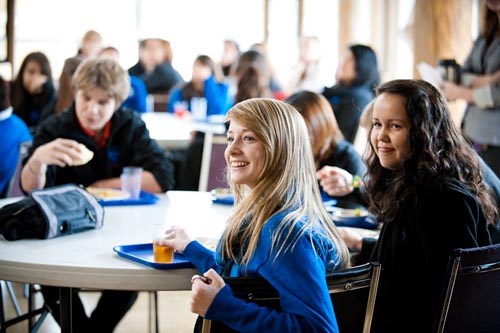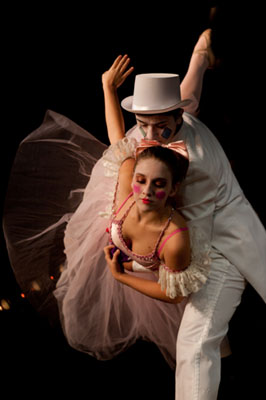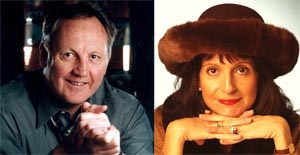

"The way to improve the quality of teaching is through teamwork in the schools, and then surround it with better teacher pre-service, better attraction of the profession, and
better professional development." -- Michael Fullan
Michael Fullan has been working to identify the right drivers for whole system education reform. His paper, "Choosing the Wrong Drivers for Whole System Reform," has stimulated considerable interest from educators around the world (including the U.S.) to understand the policies and strategies that can help get education into successful system reform, i.e. real solutions to closing the achievement gap and improving learning so that students learn better than they did before.
Michael Fullan is Professor Emeritus at the Ontario Institute for Studies in Education at the University of Toronto, and is Special Adviser on Education to Dalton McGuinty, the Premier of Ontario. Fullan served as dean of the faculty of education at the University of Toronto from 1988 to 2003. He is currently working as adviser and consultant on several major education reform initiatives around the world. His work is based on how large-scale reform can be successfully accomplished. He has written several best sellers on leadership and change. His latest book is Change Leader: Learning to Do What Matters Most.
What kind of education system will permit a country to have the people skills needed to compete globally?
We did a qualitative study called "The Slow Road to Higher Order Skills" to take a look at what we call the 21st century skills. The skills that are normally listed, like creativity, communication, collaboration, problem solving, reasoning and digital literacy, are not well operationalized. Even though there has been a big project from Cisco/Intel/Microsoft to do that, the progress has been very slow. In Ontario, we want to start deeply with literacy and numeracy. We do not want to be narrow in our focus, but we also do not want to get into the vagaries of the 21st century skills that people talk about but do not operationalize. In short, no one seems to know what "there" looks like when it comes to higher order skills, and correspondingly, no one knows how to get there.
What are your views on standardized testing?
The worst thing a system can do is load up on standards and assessments in a way that overwhelms schools. This is wrong driver number one. Instead, we have to focus on instruction and learning (personalized to each student) as the centerpiece, and then link to standards and assessments. The driver here has to be assessment-instruction up close with the student and the teacher. In my paper, "Choosing the Wrong Drivers for Whole System Reform," I identified how some systems are mishandling accountability.
Note: To briefly summarize Fullan's paper, the four wrong drivers are the focus on accountability (versus intrinsic motivation and capacity building), individual quality (versus group quality), technology (versus instruction), fragmented (versus systemic) solutions.
Testing is important in what I am going to call the accountability strategy, but the push on standardized testing can become too narrow and it becomes a mindset that says we have to load up on assessment and also identify with world class standards (such as PISA) in terms of assessment. Almost all of the skills that I consider the high order skills are measurable if you want to measure them. Politicians make assessments based on testing that is narrower than it should be. The PISA test is a great example of how we can break out of that mold. On top of this, we have been working on the "black box" of implementation for which you not only need better assessments, but you also need innovative instruction in relation to those assessments. Once again, the core is assessment-instruction personalized to each learner.
We seem to have become assessment obsessed in the U.S. since our poor results in the last PISA Test.
The greater urgency the U.S. places on competing internationally, the more that becomes an obsession in the wrong direction. The U.S. school systems have been losing ground since 1980 with growing gaps between high and low performers, and poor rankings internationally. The U.S. needs to take PISA benchmarks seriously, they need to get behind the numbers and realize that the top performers got there by building the collective capacity of teachers in the country -- all the teachers.

"With Sir Ken Robinson, we want to map out the curriculum that includes
the arts as well as literacy and math." -- Michael Fullan
What can be done to better address the emotional well-being of some kids today given the rise in competition and the pressure to achieve?
We have too many tests, so one way to reduce stress is to have fewer tests. I agree we have to reduce the stress on kids. Enabling them to have more success would be a great stress reducer. So, I would rather ask first what goals we are striving for. Let's build those goals into the learning experience. And those goals have to include the well-being of our kids.
I think of the problem as a three legged stool. Let's call the three legs: standards, assessment, and instruction. I want to go beyond the word curriculum and focus also on instruction. We've got standards. Even though they've not improved enough, there is a foot in the door around higher level skills, which should include well being. Our solution is to strengthen the two way street between instruction and assessment. Assessment should be a strategy teachers use to personalize the curriculum for kids and to improve instruction.
Dylan Wiliam has published a book called Embedded Formative Assessment (Solution Tree), and it's all about teachers and students engaged in the two way street between instruction and assessment of how they are doing. The answer for me is to zero in on instruction and assessment. In addition, we are beginning to work with Sir Ken Robinson to ensure curriculum is broadened to include the arts. Students' well-being will be greatly served by tapping into the intrinsic motivation of a range of kids.
Note: see Global Search for Education, my interviews with Sir Ken Robinson and with Dylan Wiliam.
What is the nature of the respect for teachers in countries that are doing well in education?
When you look at Finland, Singapore, South Korea and Hong Kong, all of which have high quality teachers, you will see that it's not just that they have good teachers, but also because they have improved the whole profession. It's a combination of incentivizing teachers and improving working conditions. Teacher's salaries have been going up in the U.S., so it's not just about teachers' salaries. It is more about the respect for teachers, the quality of their preparation, the working conditions, and enabling teachers to work together. It's a big task for the U.S. because the U.S. is starting so far behind.
What the U.S. is counting on is the wrong driver on teacher appraisal. We think the way to improve the quality of teaching is through teamwork in the schools, and then surround it with better teacher pre-service, better attraction of the profession, and better professional development. Those surround things are enablers rather than causes, and the core cause is to improve the profession itself. You have to improve the entire teaching profession, not just reward the top 20 percent and punish the bottom 20 percent. You have to improve the daily work of all teachers, which is what we are doing in Ontario.
Does Canada's definition of educational excellence take into account the quality of life of individuals and of a society's artistic and cultural achievements?
No, not yet. I have been an advisor to the Premier of Ontario since 2003. We are in our 8th year now and we have spent a lot of time getting the house in order, so to speak. I would say that what we have done is get to the point where our next phase is to go for the whole well-being of the child. We have the stage set to do that. Five years ago, OECD UNESCO did a report on child well-being in rich countries. This study assessed the well being of students in about 20 countries. It showed Canada well down. A policy objective has to be the well-being of students. We are looking forward to working with Sir Ken Robinson from the UK who, as you know, has advocated for the arts in education for over a decade. We need to integrate some of Ken's thinking into our ongoing goals. Specifically, what we are now working on is to integrate technology, pedagogy, and change knowledge to accelerate personalized learning. We need learning that is deeply engaging for students, precise (i.e. it has to be specific and concrete), high yield (big return for the effort) and higher order. With Sir Ken Robinson, we want to map out the curriculum that includes the arts as well as literacy and math.

Professor Michael Fullan and C. M. Rubin
Photos courtesy of the Dwight School and Michael Fullan
In The Global Search for Education, join me and globally renowned thought leaders including Sir Michael Barber (UK), Dr. Leon Botstein (US), Dr. Linda Darling-Hammond (US), Dr. Madhav Chavan (India), Professor Michael Fullan (Canada), Professor Howard Gardner (US), Professor Yvonne Hellman (The Netherlands), Professor Kristin Helstad (Norway), Professor Rose Hipkins (New Zealand), Professor Cornelia Hoogland (Canada), Mme. Chantal Kaufmann (Belgium), Professor Dominique Lafontaine (Belgium), Professor Hugh Lauder (UK), Professor Ben Levin (Canada), Professor Barry McGaw (Australia), Professor R. Natarajan (India), Sridhar Rajagopalan (India), Sir Ken Robinson (UK), Professor Pasi Sahlberg (Finland), Andreas Schleicher (PISA, OECD), Dr. Anthony Seldon, Dr. David Shaffer (US), Dr. Kirsten Sivesind (Norway), Chancellor Stephen Spahn (US), Yves Theze (Lycee Francais US), Professor Charles Ungerleider (Canada), Professor Tony Wagner (US), Professor Dylan Wiliam (UK), Professor Theo Wubbels (The Netherlands), Professor Michael Young (UK), and Professor Minxuan Zhang (China) as they explore the big picture education questions that all nations face today.
